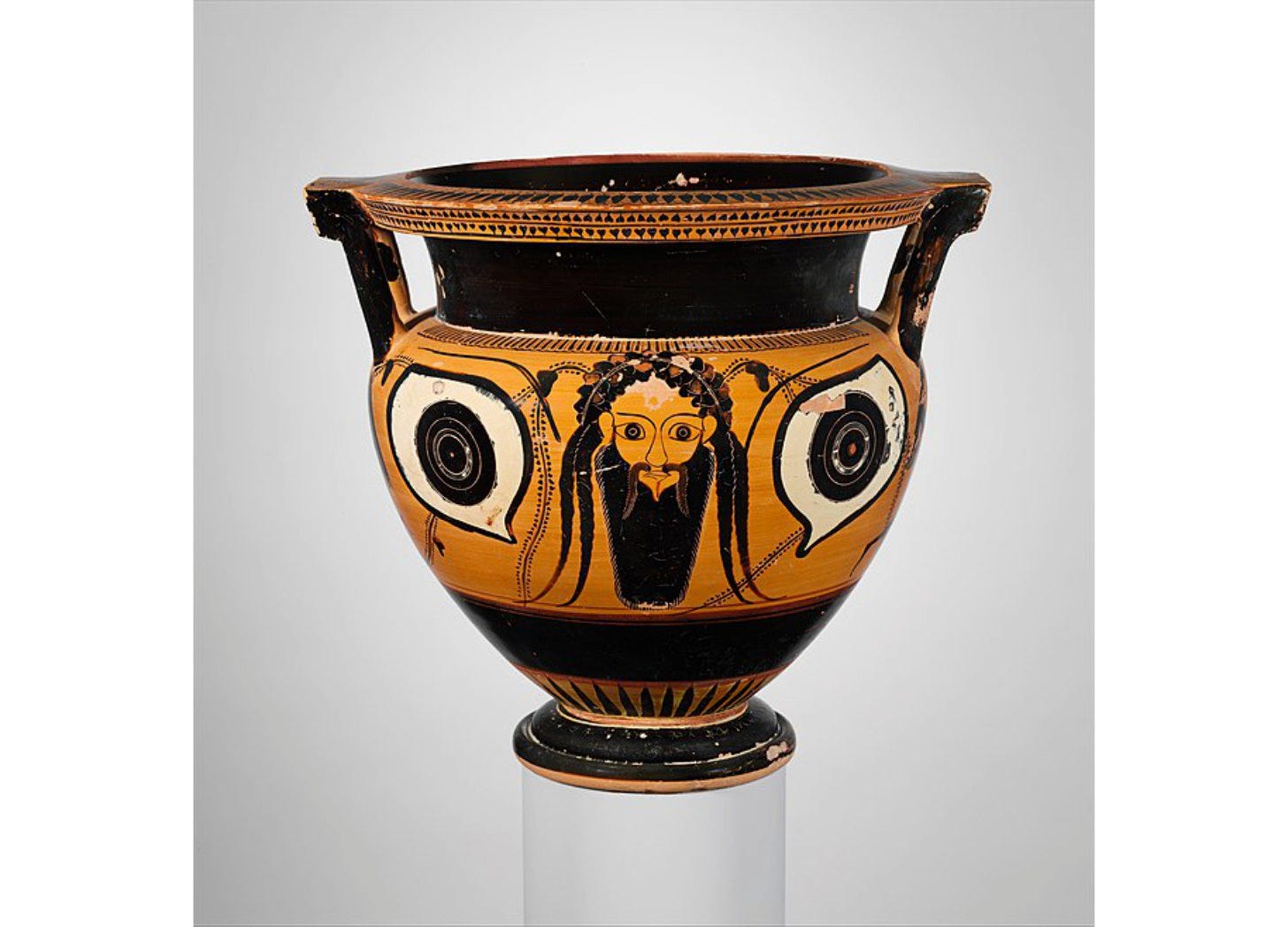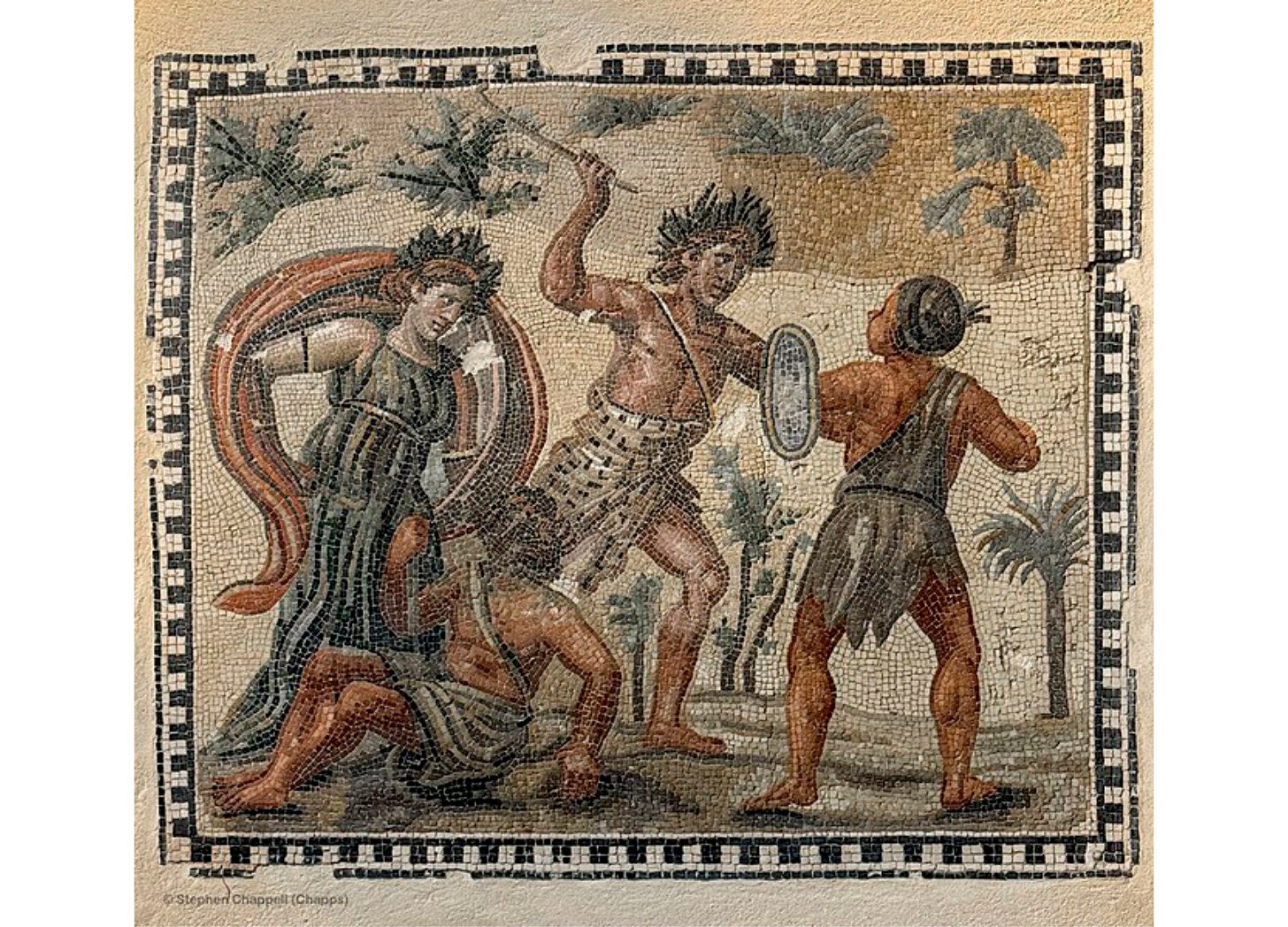All the nonsense around the Olympics inspired me to start reading up on Dionysus. I was significantly annoyed that first, the Olympic committee put their stamp of approval on this mess of a performance. Plenty of people on Substack have commented on its flawed design and implementation and I don’t need to beleaguer it here.
But I’d like to talk about the Greek god of wine, song, madness, theater, and sometimes war, Dionysus.
When I was a kid, the common explanation of myths was that they were how the ancient peoples understood the world. The tone was always one of contempt as if one were discussing children. The idea was that the ancient people believed their stories were true in the literal sense. How silly was that? Whereas, the Bible was quite true. God created the world in seven days and was about 4000 years old. Etc. Mind you, my mother didn’t necessarily believe this, but then my mother never talked about what she believed. This came from my Mennonite babysitter.
At that time, I didn’t especially care what the ancient people thought was real or not. I enjoyed the stories, whether they came from the Bible or my big golden book of Greek mythology.
But the ancient people weren’t nearly that stupid. The Biblical and other ancient stories were a corpus of literature that demonstrated what the gods wanted, and how we should live in the cultures from which the stories came. The earth has many different environments, and cultures must vary to accommodate that. Culture is what we transmit to the next generation so that they can survive in the environment in which their ancestors lived. In this way, myths bear a resemblance to DNA.
The Dionysus reference is going to be a different issue for me a Pagan, than it’s going to be for Christians. For Christians, this is very much about order and chaos and any Christians reading this may feel free to correct me if they disagree and explain why. I would look forward to such a discussion.
Here’s the meme that included the Wikipedia definition of the god, Dionysus, with wine and madness circled.
I’m not asking for paid subscribers, but if you like this then perhaps you could…
Or have a look at the books I write under pen name Sabrina Rosen.
Dionysus is a complicated deity. He has many names, and various of these names are found in other cultures in the ancient world. In Ovid’s Metamorphosis, which he pulled from Euripides, Dionysus is the child of the god Zeus and a princess of Thebes, named Semele. It should be noted that this was his second incarnation, Hera having managed to kill him once already by having the Titans tear him apart.
Dionysus was known for his protection and nurture of women who protected him in return. Women were his followers and depicted as his close companions. The mother of Alexander the Great, and one of the queens of Macedonia, were devout worshipers. While the Maenads were more often portrayed as young women, matrons who had already born children were considered entirely acceptable, and welcome in the rites.
Semele, manipulated by further machinations of the mother goddess, dies, leaving Dionysus orphaned. Zeus rescues the child from his dying mother’s womb and gives him into the care of a nymph. After this, Hera drives him mad and he wanders the world, eventually inventing mead and wine.
People recognized him as a god and began to worship him. However, King Pentheus of Thebes believed this was a mockery and refused to acknowledge Dionysus‘ divinity. A battle ensued. King Pentheus took one of Dionysus’ acolytes as a prisoner and refused to believe in the god’s divinity even after hearing the prisoner’s calmly presented story of the god’s miracles. After Dionysus helps his acolyte escape, through acts miraculous, Pentheus decides he’s going to go spy on the women’s rites of Dionysus. There, he is torn limb from limb by his mother and aunts.
It would be very easy to take all this as not just a cautionary tale, but a model of evil. The problem with that assessment would be that the Greeks didn’t view evil as a separate entity as Christians do. If bad things happened, it was either your fate, or something really stupid you did. Fate couldn’t be sidestepped. However, there were numerous precautionary tales indicating what behaviors it was wise to avoid.
Rather than viewing the world as a place of good versus evil, the Greeks sought to find balance in virtue. Aristotle‘s Nichomidean Ethics is a treatise on finding the middle way that allows one to have wisdom, courage, temperance, and justice. Certainly, there were other virtues but these were the most prized and seen as the most important. Finding the middle way meant honoring all of the gods not just some of them. In their totality, the gods represent the best of what we can be.
So, what makes Dionysus important? So important that the Greeks would tell a gruesome cautionary tale about what happens if one denies him?
To answer this, I’m going to lean a little bit on my feminine nature. It’s hard to be human, and we all have things in our nature that need to be restrained and both men and women like to let go a little bit. That element of chaos, which is so often associated with the feminine, is also an aspect of creation. In order for something new to come into the world, someone needs to reach into the void and pull it out. We can’t do that if we are locked forever into a specific structure.
[In any case, the structure isn’t safe, as much as it might appear to be. Nature isn’t stable, and no matter how strong we make the fortress of culture, some change will come along that will force that fortress into the ground. That’s when we need the chaos of creativity to solve the problem.]
Women are a little closer to that chaos. When we carry children, our bodies dissolve just a little bit and our consciousness merges with our child. We are empathetic and often have trouble holding our boundaries, no matter how much we know we should. Holding one’s self separate is work. The Greeks recognized that women are closer to that blurring chaos, and thus more susceptible to it than men.
It’s worth noting that women in Athens had very little agency. They were kept indoors and under strict control [with the exception of the Heterea,] and had no voice in social affairs. The Dionysian rites observed by Pentheus were strictly for women and were an opportunity to run the howling in the woods. I know from personal experience that this is a valid way to let off some steam. The ritual space was a safe place as opposed to true chaos. Dionysian worship includes some wine. However, it didn’t include getting pissed drunk. The ancient literature includes prohibitions on more than three droughts. One was supposed to get a little soft around the edges and enjoy some merriment, but not get violently drunk. I doubt much wine was necessary for the women in these rites.
It was chaos in a container.
Chaos that stopped at the end of the ritual.
Chaos that was not brought home.
Chaos that didn’t disrupt the structure of the society.
That chaos served several functions. Perhaps the most important was the oracles. The oracles were considered so important in the ancient world that temples were built for them. There’s a specific state of mind required to allow the voice of a god to travel through one. The rights of Dionysus were designed to allow that to happen. If it looked wild from the outside, it had an important and intended purpose within the structure of the culture.
Our greatest blessings come to us via madness… Which is indeed a divine gift – Plato, Phaedrus
Creativity is messy. Channeling art or the voice of the unseen world can look frenzied, as if the person were completely mad. That kind of channeling is indeed, intense.
But what about the idea that Dionysus was a god of sex? There isn’t any evidence for that. While he had some liaisons, he didn’t have nearly as many as Zeus or Apollo, neither of which are associated with sexuality. Nor is there any iconography of him fornicating. In myth, he is partnered with Ariadne, and they are portrayed as a happily married couple. He is also described as being asexual or perhaps above sexuality. This would suggest that while sex is important, it’s not the most important.
The orgies and depraved behavior described by Roman historian Titus Livius probably did occur. But I have two brief points in that regard. First, modern scholars are well-served to be skeptical as to the degree of depravity Livy describes. Second, the Romans took a female-only cult and added men.
On further consideration, maybe the ‘celebrations’ at the Olympics were closer to history than I thought. But they should have called the blue Smurf guy Bacchus. Dionysus actually cared about women.
If you’re curious about Paganism/Heathenism/Wicca, please feel free to message me and I’ll be happy to answer questions.
Selina Rifkin, M.S. [Nutrition], LMT, has been Pagan since she was 14 [which was a long time ago] and been to Hades in a handbasket. More than once. This has given her some opinions. She has direct communication with her gods and they’ve always given her answers when she asks. [One does have to ask.] Like most of her generation [X] she’s okay with snark. Most days she tries for good writing. But the snark, and side comments creep in. Be warned.








This was a refreshing read. Not that I necessarily disagree with the angry takes mostly from conservative catholics, but there were simply too many of them. Thank you!
I love how you dig into the layers of things and somehow very rationally explain that which is quite mystical- great read as always. 🫶🏼🙏🏼✨✨